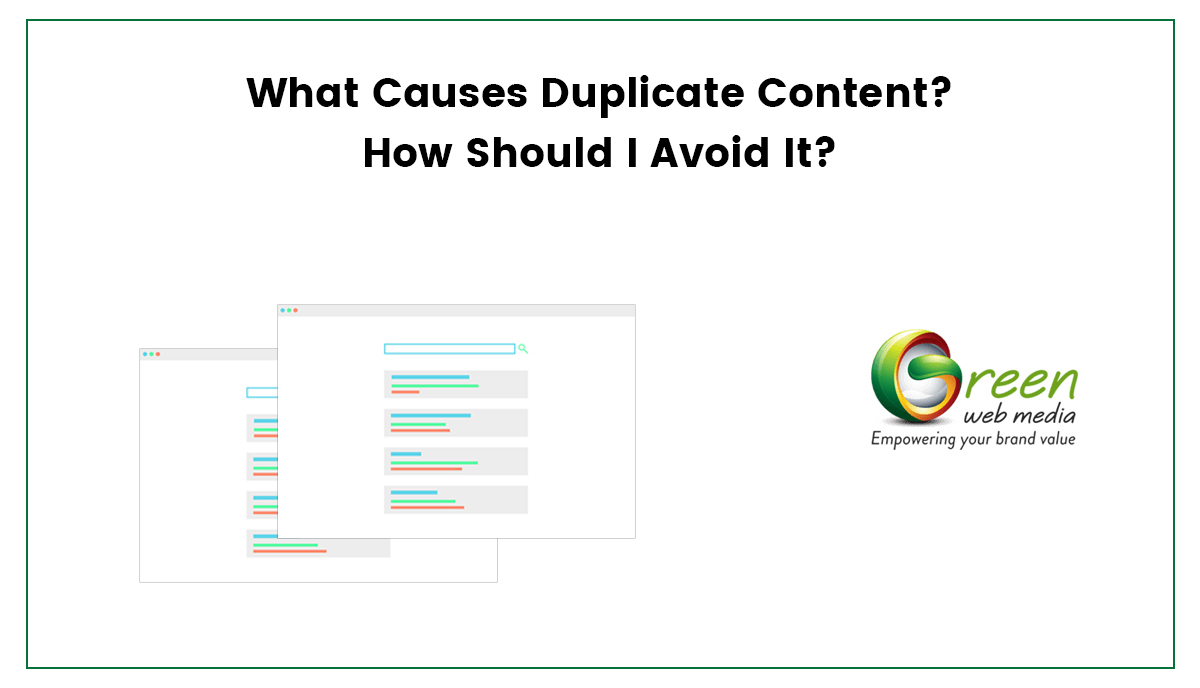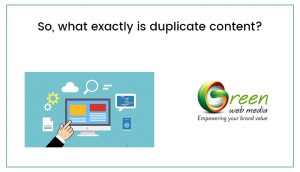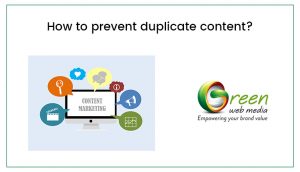What Causes Duplicate Content? How Should I Avoid It?

Owning a website is never an easy task. There are a lot of things that go into making one. Besides, one has to optimize the site in order to make it visible on the search engines.
Even though search engine optimization or SEO is a highly effective tactic to increase brand visibility, it may not perform as it should if your website has duplicate content. This could be anything from the boilerplate text on the website to the product description on the e-commerce site that was taken from an original seller or even a quote.
And no matter how hard you try, it isn’t possible to offer 100% unique content on your website. Besides, it is estimated that 29% of pages have duplicate content.
So, what exactly is duplicate content?

Duplicate content is nothing but content that is exactly similar to the content posted somewhere else. But, sometimes, the term duplicate content can also indicate almost identical content that is a result of swapping a few terms.
And performing such tricks will not necessarily save a page from being deemed as duplicate content. As a result, your organic search performance can have a negative impact.
Duplicate content can also be the same content spread across multiple web pages of your site or two or more different websites. But there are many ways to tackle or minimize the impact of duplicate content using technical fixes that we will take a look at in a few minutes. Before that, let’s understand –
Can duplicate content result in a penalty?
Even though having duplicate content on your website can obstruct the performance of SEO, it won’t necessarily result in a Google penalty until you haven’t intentionally copied content from someone else’s website.

Some technical website challenges don’t indicate that you are trying to trick Google. So, there is no need to be worried about being penalized.
But, if you have copied huge amounts of content from other people, then you are walking on thin ice. Unless the intent of the duplicate content isn’t deceptive and manipulating the search engines, you are good.
The impact of duplicate content
Pages produced with duplicate content can result in various consequences in the Google search results and sometimes even lead to penalties. A few of the very common issues of duplicate content are:
- Fluctuations or reduction in core site metrics such as rank positions, traffic, etc.
- SERPs end up showing the wrong version of pages
- Due to confusing prioritization signals, search engines may take
- unexpected actions
- Reduced performance of key pages and problems with indexing
Even though it is hard to understand which elements of the content will be prioritized or deprioritized by Google that is why Google always suggests making the pages relevant for users and not the search engines.

By keeping that in mind, the starting point for any SEO or webmaster should be of producing unique content that helps in catering to unique values. But again, it isn’t easy or even possible to do that because many factors like search functionality, UTM tags, templating content, syndicating content, information sharing can increase the risk of duplication.
That is why doing regular maintenance of the site, clearing architecture and gaining technical understanding is key to combating the creation of duplicate content.
How does redundant content occur?
Website owners don’t necessarily create duplicate content intentionally. But that doesn’t mean your site doesn’t have duplicate content.
Following are a few common ways duplicate content is created unintentionally:
1- URL variations: URL parameters like analytics code and some click tracking can result in duplicate content issues. This problem isn’t only the result of the parameters themselves but also the order in which those parameters are in the URL itself.
Likewise, even session IDs can result in duplicate content creation whenever a user that visits the website gets assigned with a different session ID stored in the URL.
Also, when multiple page versions get indexed, the printer-friendly versions of content can result in duplication, too.
So, the notion here is to avoid adding URL parameters or even URLs’ alternate versions.
2- HTTP vs HTTPS or WWW vs non-WWW pages: If your website has two different versions at “site.com” and www.site.com, then there will be similar contents live at both places. This means you have effectively produced duplicates of each of these pages.
The same is the situation with versions that have HTTP:// and HTTPS://. If you have both of these sites live and visible to search engines, you will have the issue of duplicate content.
3- Scraped or copied content: Content can be anything from blog posts to editorial content and even product information pages. Scrapers republishing such information on their sites is one of the most familiar sources of content duplication.
The same issue is faced by e-commerce sites in the form of product information being scraped or even copied.
If any website is selling similar items and ends up using the same description created by the manufacturer for the items, then identical content will end up on various websites.
How to prevent duplicate content?

There are a few ways of preventing the creation of duplicate content, such as:
1- Taxonomy: The first thing you can do is take a general look at your website’s taxonomy. No matter if you have a new, existing or revised document, it is best to map out the pages from a crawl and then assign a unique H1 along with a focus keyword.
By organizing the content, you can develop a thoughtful strategy that limits the creation of duplicate content.
2- Canonical tags: One of the most effective elements in combating duplication of content on the website or various other websites are canonical tags.
The rel=canonical element is an HTML code’s snippet that tells Google that particular content is owned by a publisher even if the content is found elsewhere. These tags tell Google which version of the content is the “main version.”
The canonical tags can be used across print vs web versions of the content, multiple locations targeting pages and even mobile or desktop page versions.
There are two types of canonical tags, one that points to a page and another that points away from the page. The canonical tags that point away from a page let the search engine know that there is another version of the page – “the master version.”
3- Meta tagging: Another useful and technical way of looking into the duplicate content issue on the site are Meta robots as well as the signals you are sending from your pages to search engines.
Meta robots are useful if you want to exclude specific page or pages from being indexed by Google and wish them not to appear on the search results.
All you need to do is add the “no index” meta robots tag to the HTML code of the page and let Google know that you don’t want the page to be listed on SERPs.
4- Parameter handling: URL parameter signifies how to crawl sites efficiently and effectively for search engines. As mentioned earlier, parameters can cause duplications because their usage can produce various copies of the pages.
Try employing parameter handling through Google Search Control or Bing webmaster tools. By doing so, you can indicate parameterized pages and let the search engines know that these pages aren’t supposed to be crawled and the types of actions to be taken (if any).
5- Duplicate URLs: We have also mentioned how structural URL elements can result in the creation of duplicate content on the website.
The lack of clarity and even wrong signaling can result in fluctuation of reduction in core site metrics such as EAT criteria, rank positions and traffic.
With www vs non-www, you need to identify the most commonly used version and stick to it on every page to avoid the risk of duplication. Moreover, redirects should be set so the directs are done to the right page that actually needs to be indexed, therefore removing the risk of duplication.
When it comes to HTTP:// vs HTTPS://, it is always best to opt for the later one as the HTTPS version uses encryption to make the pages secure.
6- Redirects: Lastly, redirecting can prove highly useful to reduce duplicate content. For instance, the pages duplicated from a particular page can be redirected back to the main version.
When opting for redirects to get rid of duplicate content, it is best to remember two important things:
- Always redirect the pages to high-performing pages to restrict the impact on your site’s performance.
- If possible, use 301 redirects to preserve the PageRank.
Final thoughts
One of the best ways of avoiding duplicate content is by creating unique quality content for the site. Also, carefully structuring the site and focusing on the users and their journey on your website is key to avoiding content duplication in the safest way.
Besides, if the duplication is a result of technical factors, then the above-mentioned tactics can reduce the risk. Also, based on how the duplication has occurred, you can employ one or more tactics to prove that your content is original and other versions are duplicates.





